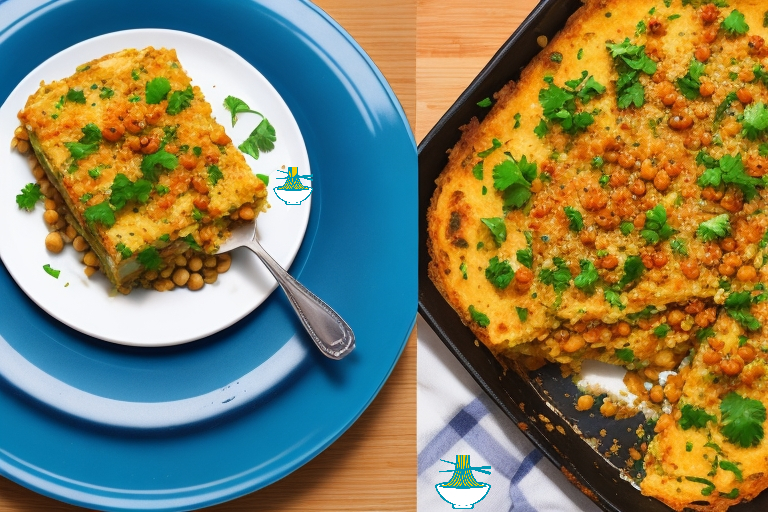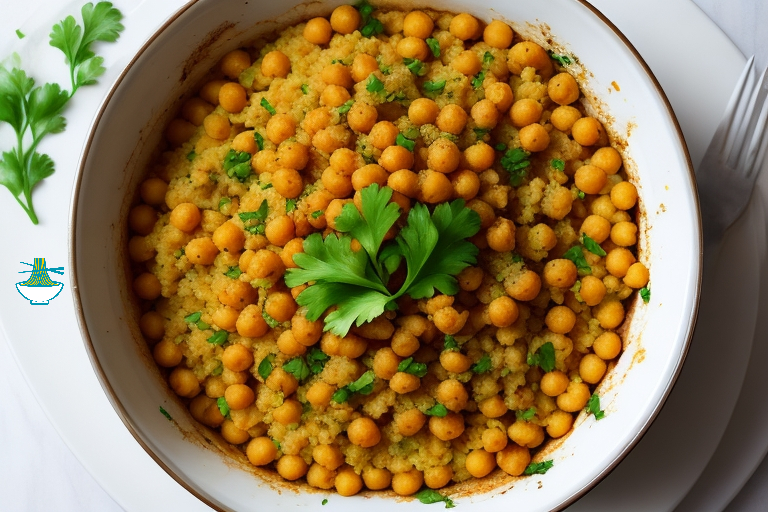Karantika, a cherished dish in Algerian cuisine, is a savory chickpea gratin celebrated for its robust flavors and cultural significance. Packed with essential nutrients, chickpeas in Karantika are a rich source of protein, fiber, and vitamins like B6 and folate, supporting digestion and overall health. The aromatic spices—cumin, paprika, and cayenne pepper—not only enhance its flavor but also provide anti-inflammatory and antioxidant benefits. However, its high carbohydrate content may not suit low-carb diets if consumed in excess. Known as "Karantika Bel Kashta," this dish embodies Algeria's rich culinary heritage, offering a wholesome and delicious experience.

Ingredients:
For the Chickpeas:
- 2 cups dried chickpeas, soaked overnight and drained
- 1 onion, finely chopped
- 3 cloves of garlic, minced
- 1/4 cup olive oil
- 1 teaspoon ground cumin
- 1 teaspoon paprika
- 1/2 teaspoon cayenne pepper (adjust to your spice preference)
- Salt and pepper to taste
- Water
For the Gratin:
- 2 tablespoons olive oil
- 1 onion, finely chopped
- 2 cloves of garlic, minced
- 1 can (14 oz) diced tomatoes
- 1/2 teaspoon ground cumin
- 1/2 teaspoon paprika
- 1/2 teaspoon cayenne pepper
- Salt and pepper to taste
- 1/4 cup fresh parsley, chopped
- 4 eggs
- Grated cheese (optional)
- Additional fresh parsley for garnish
Ingredient Alternatives
- Fresh Tomatoes vs. Canned Tomatoes: You can use fresh tomatoes instead of canned diced tomatoes by blanching and peeling 3-4 medium-sized tomatoes and chopping them finely.
- Chickpea Flour vs. Dried Chickpeas: Chickpea flour can be used to save time. Mix it with water to form a batter-like consistency.
- Spice Variations: Adjust the spices to your preference. For a milder flavor, reduce cayenne pepper or substitute it with sweet paprika. You can also experiment with turmeric or coriander for a unique twist.
- Cheese Options: If grated cheese is optional, you may use alternatives like feta, mozzarella, or even nutritional yeast for a vegan-friendly option.
Instructions:
1. Prepare the Chickpeas: a. In a large pot, heat the 1/4 cup of olive oil over medium heat. Add the chopped onion and sauté until it becomes translucent. b. Add the minced garlic and sauté for another minute until fragrant. c. Stir in the cumin, paprika, cayenne pepper, salt, and pepper. Mix well. d. Add the soaked and drained chickpeas and enough water to cover them by about 2 inches. e. Bring the mixture to a boil, then reduce the heat to low, cover, and simmer for about 1.5 to 2 hours or until the chickpeas are tender. You may need to add more water during cooking to keep them covered.
2. Make the Gratin: a. In a separate pan, heat the 2 tablespoons of olive oil over medium heat. Add the chopped onion and sauté until it becomes translucent. b. Stir in the minced garlic, ground cumin, paprika, cayenne pepper, salt, and pepper. Cook for about 2 minutes. c. Add the canned diced tomatoes and cook for an additional 5-7 minutes until the mixture thickens.
3. Combine the Chickpeas and Gratin: a. Preheat your oven to 350°F (175°C). b. Combine the cooked chickpeas and tomato mixture, mixing them thoroughly. Add the fresh parsley and mix again.
4. Bake the Karantika: a. Transfer the chickpea and tomato mixture to a baking dish. b. Create four small wells in the mixture and break an egg into each well. c. If desired, sprinkle grated cheese over the top of the mixture. d. Bake in the preheated oven for about 15-20 minutes or until the egg whites are set, and the yolks are still slightly runny.
5. Serve: a. Garnish the Karantika with additional fresh parsley. b. Serve hot with crusty bread or as a side dish to enjoy the flavors of Algerian chickpea gratin.
Enjoy your homemade Karantika, a delightful Algerian dish that's sure to satisfy your taste buds!
Common Questions:
Can Karantika be prepared as a fully vegan dish?
- Yes, Karantika is naturally vegan if you exclude eggs and cheese. You can use flaxseed or chia seeds mixed with water as a substitute for eggs.
How long can the dish be stored after preparation?
- Karantika can be refrigerated in an airtight container for up to 3 days. Reheat it in the oven or microwave before serving.
Can chickpea flour replace dried chickpeas?
- Absolutely! Chickpea flour offers a quicker alternative. Mix it with water to achieve the desired consistency, then proceed with the recipe as outlined.
How can I improve the flavor of Karantika?
- Soak chickpeas with a pinch of cumin or garlic powder for enhanced flavor.
Use high-quality olive oil to elevate the dish's taste.
What are the potential downsides of Karantika?
- Individuals with legume allergies should avoid this dish.
- If using large amounts of cheese, it may not be suitable for those with high cholesterol.
How can Karantika be served?
- Karantika can be served as a main course or a side dish, paired with crusty bread or a fresh salad.
Can Karantika be frozen?
- Yes, Karantika can be frozen for up to a month. However, for the best texture and flavor, consume it fresh.
Can Karantika be made without spicy seasonings?
- Certainly! Omit cayenne pepper and use sweet paprika or other mild spices instead.
What type of cheese works best?
- Parmesan or gruyère cheese is ideal, but any melting cheese, like cheddar, works well.
Can canned chickpeas be used instead of dried?
- Yes, canned chickpeas can save preparation time. Ensure they’re thoroughly rinsed and drained before use.
What are the benefits of chickpeas for athletes?
- Chickpeas are a rich source of protein, complex carbohydrates, and fiber, making them an excellent energy source for athletes. They also provide essential minerals like magnesium and potassium for muscle recovery.

Nutritional Values
Here are the approximate nutritional values for the key ingredients in the Algerian Chickpeas Gratin (Karantika) recipe. Please note that these values can vary depending on specific brands and variations in ingredient quantities used:
For the Chickpeas:
2 cups dried chickpeas (approximately 380g)
- Calories: 684 kcal
- Protein: 36g
- Carbohydrates: 116g
- Fiber: 20g
- Fat: 12g
Benefit: Chickpeas are an excellent source of plant-based protein, making them a great choice for vegetarians and vegans. They are also rich in fiber, which supports digestive health and helps maintain stable blood sugar levels.
1 onion (approximately 110g)
- Calories: 44 kcal
- Protein: 1g
- Carbohydrates: 11g
- Fiber: 2g
- Fat: 0g
Benefit: Onions contain antioxidants like quercetin, which can reduce inflammation and improve heart health. They are also rich in vitamins and minerals, supporting immune function.
3 cloves of garlic (approximately 9g)
- Calories: 13 kcal
- Protein: 0.6g
- Carbohydrates: 3g
- Fiber: 0.5g
- Fat: 0g
Benefit: Garlic is known for its powerful antimicrobial and anti-inflammatory properties. It may also help lower cholesterol levels and support heart health.
1/4 cup olive oil (approximately 60g)
- Calories: 477 kcal
- Protein: 0g
- Carbohydrates: 0g
- Fiber: 0g
- Fat: 54g
Benefit: Olive oil is rich in monounsaturated fats, which are heart-healthy and can reduce the risk of chronic diseases. It also contains antioxidants that support overall health and longevity.
1 teaspoon ground cumin (approximately 2g)
- Calories: 8 kcal
- Protein: 0.4g
- Carbohydrates: 1g
- Fiber: 0.6g
- Fat: 0.5g
Benefit: Cumin has digestive benefits and may help with bloating and indigestion. It is also rich in antioxidants that support immune function.
1 teaspoon paprika (approximately 2g)
- Calories: 6 kcal
- Protein: 0.3g
- Carbohydrates: 1g
- Fiber: 0.6g
- Fat: 0.3g
Benefit: Paprika is high in vitamins A and E, which are essential for skin health and vision. It also contains capsaicin, which has anti-inflammatory and metabolism-boosting properties.
1/2 teaspoon cayenne pepper (approximately 1g)
- Calories: 5 kcal
- Protein: 0.2g
- Carbohydrates: 1g
- Fiber: 0.5g
- Fat: 0.3g
Benefit: Cayenne pepper contains capsaicin, which can boost metabolism, aid in digestion, and reduce pain and inflammation.
Salt and pepper
- Benefit: Salt enhances flavor, but should be used in moderation to avoid excessive sodium intake. Pepper has antioxidant properties and can improve digestion.
Water
- Benefit: Water is essential for hydration, aiding in digestion, nutrient absorption, and the overall functioning of the body.
For the Gratin:
2 tablespoons olive oil (approximately 30g)
- Calories: 238 kcal
- Protein: 0g
- Carbohydrates: 0g
- Fiber: 0g
Fat: 27g
Benefit: Olive oil provides healthy fats, which help in the absorption of fat-soluble vitamins like A, D, E, and K. It also supports heart health.
1 onion (approximately 110g)
- Calories: 44 kcal
- Protein: 1g
- Carbohydrates: 11g
- Fiber: 2g
- Fat: 0g
Benefit: Similar to its role in the chickpea section, onions provide antioxidants and support immune health.
2 cloves of garlic (approximately 6g)
- Calories: 8 kcal
- Protein: 0.4g
- Carbohydrates: 2g
- Fiber: 0.3g
- Fat: 0g
Benefit: Garlic provides antimicrobial, anti-inflammatory, and heart-healthy benefits.
1 can diced tomatoes (14 oz, approximately 396g)
- Calories: 70 kcal
- Protein: 3g
- Carbohydrates: 15g
- Fiber: 4g
- Fat: 0g
Benefit: Tomatoes are rich in lycopene, an antioxidant that helps protect against heart disease and cancer. They also provide vitamins C and A, essential for skin health and immune support.
1/2 teaspoon ground cumin (approximately 1g)
- Calories: 4 kcal
- Protein: 0.2g
- Carbohydrates: 0.5g
- Fiber: 0.3g
- Fat: 0.2g
Benefit: In addition to aiding digestion, cumin has anti-inflammatory properties and may help in reducing oxidative stress.
1/2 teaspoon paprika (approximately 1g)
- Calories: 3 kcal
- Protein: 0.2g
- Carbohydrates: 0.5g
- Fiber: 0.3g
- Fat: 0.2g
Benefit: Paprika contributes to healthy skin, vision, and a boosted metabolism.
1/2 teaspoon cayenne pepper (approximately 1g)
- Calories: 5 kcal
- Protein: 0.2g
- Carbohydrates: 1g
- Fiber: 0.5g
- Fat: 0.3g
Benefit: Cayenne pepper boosts metabolism, reduces pain, and aids in digestion.
Salt and pepper
- Benefit: Used in moderation, salt enhances flavor and supports hydration, while pepper promotes digestive health.
1/4 cup fresh parsley (approximately 15g)
- Calories: 5 kcal
- Protein: 0.5g
- Carbohydrates: 1g
- Fiber: 1g
- Fat: 0g
Benefit: Parsley is high in vitamin C and antioxidants, supporting immune health and reducing inflammation.
4 eggs (approximately 200g)
- Calories: 320 kcal
- Protein: 28g
- Carbohydrates: 2g
- Fiber: 0g
- Fat: 22g
Benefit: Eggs are a complete source of protein and contain essential nutrients such as vitamin B12, which supports brain health, and choline, which is important for liver function.
Grated cheese (optional, approximately 28g)
- Calories: 110 kcal
- Protein: 7g
- Carbohydrates: 1g
- Fiber: 0g
- Fat: 9g
Benefit: Cheese provides calcium for bone health, as well as protein and fat for energy.
Additional fresh parsley (for garnish, approximately 5g)
- Calories: 1 kcal
- Protein: 0.1g
- Carbohydrates: 0.2g
- Fiber: 0.2g
- Fat: 0g
Benefit: Fresh parsley is packed with vitamins A, C, and K, which are vital for immune health, skin health, and bone strength.
Total Estimated Nutritional Values (for the whole dish without cheese):
- Calories: ~1,495 kcal
- Protein: ~80g
- Carbohydrates: ~160g
- Fiber: ~30g
- Fat: ~120g
With Grated Cheese:
- Calories: ~1,605 kcal
- Protein: ~87g
- Carbohydrates: ~161g
- Fiber: ~30g
- Fat: ~129g
Keep in mind that these values are approximate and can vary based on specific ingredients and preparation methods. If you require more precise nutritional information, you may consider using a nutritional calculator or contacting a registered dietitian for assistance.


Comments